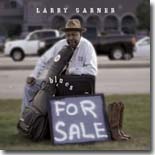 With Blues For Sale (DixieFrog), Larry
Garner did things a little differently. Due to
circumstance mostly beyond his control, Garner took
a lot longer to complete this recording. He used his
band and fellow musicians from the Baton Rouge area.
He took more time writing songs, recording two or
three at a time. The resulting work features some of
his best songwriting and a relaxed, almost laidback
approach to the blues. In fact, this is probably the
most “Louisiana” of his recordings, both in music
and atmosphere.
With Blues For Sale (DixieFrog), Larry
Garner did things a little differently. Due to
circumstance mostly beyond his control, Garner took
a lot longer to complete this recording. He used his
band and fellow musicians from the Baton Rouge area.
He took more time writing songs, recording two or
three at a time. The resulting work features some of
his best songwriting and a relaxed, almost laidback
approach to the blues. In fact, this is probably the
most “Louisiana” of his recordings, both in music
and atmosphere.
The songs rank with Garner’s best work, too. “Broken
Soldier” is a vivid telling of the plight of an
exhausted veteran returning from a rough stint in
the Middle East. “If You Come to Louisiana”
convincingly sings the praises of Garner’s home
state. “Alone and Happy” tells the tale of a woman
who’s single and loving it, and a pair of songs
achingly convey the pain of splintered relationships
(“It’s Killing Me” and “Rebound”).
Of course, Garner’s unique perspective on life, as
well as his sense of humor, comes through on most of
his material and songs like the thought-provoking “A
Whole Lotta Nothing,” the spicy “Talking Naughty,”
“Miss Boss,” and “Car Seat Baby” expertly convey
these feelings.
Garner’s vocals are spot-on and his guitar has
developed a nice B.B. King sting on recent albums.
Jared Daigle’s fretwork has more of a rock edge, but
he and Garner mesh well and he does a good job when
given the opportunity. The rest of the band is solid
as well, with Shedrick Nellon and Miguel Hernandez
splitting time on bass, Michael Caesar on drums,
Nelson Blanchard on keyboards, and the ethereal Mr.
Mystery Man blowing sax on a couple of tracks.
Debbie Landry adds sass and sinew to several tracks
with her strong background vocals.
Blues For Sale took a little extra time to
get to us, but like Larry Garner’s other albums, it
is well worth the wait.
--- Graham Clarke
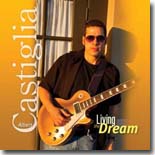 Former Junior Wells bandleader Albert Castiglia
continues to knock listeners’ socks off with his
incredible guitar work and his continuing
development as a songwriter with his latest Blue
Leaf Records release, Living the Dream.
Consisting of 12 songs, five written by Castiglia,
this is a masterful set of blues that is sure to
please longtime fans and impress newcomers.
Former Junior Wells bandleader Albert Castiglia
continues to knock listeners’ socks off with his
incredible guitar work and his continuing
development as a songwriter with his latest Blue
Leaf Records release, Living the Dream.
Consisting of 12 songs, five written by Castiglia,
this is a masterful set of blues that is sure to
please longtime fans and impress newcomers.
To get the picture of Castiglia’s prowess as a
guitarist, you really need to look at two cuts. The
scorching Freddie King instrumental, “Freddie’s
Boogie,” which is really a nearly five-minute
free-for-all between Castiglia and keyboardist John
Ginty, is one extreme. The opposite end is the
nine-minute epic version of the blues standard,
“Walk the Backstreets.” He can rock the house when
needed, but can also bring it down to a slow burn
when required.
That doesn’t mean you should disregard the rest of
the disc. Castiglia’s originals include the winning
title cut that opens the disc, one dealing with
modern subject matter (“The Man”), a blazing
instrumental (“Fat Cat”), an old school blues rocker
(“Public Enemy #9), and “I Want Her For Myself.” The
other covers are also well done, particularly Little
Richard’s “Directly From My Heart To You,” Paul
Butterfield’s “Lovin’ Cup,” Shakey Jake’s “Call Me
When You Need Me” (a solo acoustic track), and a
electrifying version of Mose Allison’s “Parchman
Farm “ that closes the disc in excellent fashion.
In addition to Castiglia’s regular rhythm section
(Bob Amsel – drums, A. J. Kelly – bass), Castiglia
gets support from Ginty (piano, B3), Sandy Mack
(harmonica), Juke Joint Jonny Rizzo (acoustic
guitar), and Emedin Rivera (percussion). However,
they give Castiglia plenty of room to nearly set
fire to his strings on most of these songs with
blistering solo after solo.
Living the Dream is another fine additon to
Albert Castiglia’s catalog. If you’re a fan of
modern blues guitar done well, look no further than
this release.
--- Graham Clarke
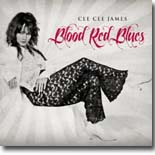 Cee Cee James has been on something of a hot
streak over the past couple of years. Her 2008
release, Low Down Where The Snakes Crawl,
received a big boost in sales and critical reception
when it was picked up and re-released by Blue Skunk
Music in 2010. Later that year, her live disc,
Seriously Raw – Live at Sunbanks, managed to
capture the fire and passion of her legendary live
shows and won her even more fans. Since then, she’s
toured almost non-stop, including a European tour
earlier this year, gaining even more fans in the
process.
Cee Cee James has been on something of a hot
streak over the past couple of years. Her 2008
release, Low Down Where The Snakes Crawl,
received a big boost in sales and critical reception
when it was picked up and re-released by Blue Skunk
Music in 2010. Later that year, her live disc,
Seriously Raw – Live at Sunbanks, managed to
capture the fire and passion of her legendary live
shows and won her even more fans. Since then, she’s
toured almost non-stop, including a European tour
earlier this year, gaining even more fans in the
process.
James’ latest CD, Blood Red Blues (FWG
Records), should easily continue that forward
momentum. Produced by the legendary Jim Gaines (who
should seriously consider legally adopting “The
Legendary” as part of his name), the new disc
features more of James’ wonderful songs, largely
taken from her own life and personal experiences,
and those incredible vocals, which bring her lyrics
to life.
As a performer, James has always been regarded as
one who leaves everything out there on stage when
she’s done. The same can be said for her albums as
well. On songs like the title track, “Wounds,” “Worn
Out Sins, and “Right To Sing The Blues,” she’s opens
up her soul for all to see, recalling the painful
times in her life and how she’s worked through that
pain and suffering to get to where she is now.
There’s also some lighter moments as well, with
tracks like “Let’s All Get Loose,” which should get
you on your feet, and “100 Ways to Make Love.” James
also praises the power of love on songs like “Cover
Me With Love,” “Thick Like Blood,” “Feel My Love
Come Down,” and “Comfort of a Good Heart.” James
sounds as good as she’s ever sounded on these
tracks, displaying an astonishing vocal range,
playing it soft and sweet where needed, and rough
and tumble when that’s required.
Of course, you can’t mention Cee Cee James without
mentioning her husband/collaborator Rob “Slideboy”
Andrews, whose serpentine fretwork on slide and
rhythm guitar punctuates each song perfectly. The
rest of the band (Chris Leighton – drums and
percussion, Dan Mohler – bass, Rocky Athas – lead
guitar, Susan Julian – keyboards) does a wonderful
job, as do the background singers (James, Stanley
Crouse, Vicki Atkins, Danunielle “Pie” Hill, and
Kimberlie Helton).
Blood Red Blues should continue Cee Cee
James’ hot streak unabated. Watch for her in a
supporting role in the upcoming movie, "We Be
Kings," which features Magic Slim & the Teardrops
and Grana Louise.
--- Graham Clarke
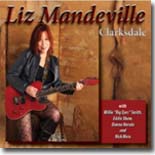 It’s been four years since Liz Mandeville’s
last recording, 2008’s Red Top. In the
interim, Mandeville battled with some health issues,
but has bounced back recently, touring and forming
her own record label, Blue Kitty Music. The label’s
debut release is Mandeville’s Clarksdale.
According to the liner notes, Mandeville made a
pilgrimage of sorts to the cradle of Mississippi
blues to recharge her batteries. She returned to
Chicago with a new perspective on the blues, and
more particularly some of the more traditional
female artists of the early blues era, like Bessie
Smith, Ida Cox, Ma Rainey, and Lucille Bogan.
It’s been four years since Liz Mandeville’s
last recording, 2008’s Red Top. In the
interim, Mandeville battled with some health issues,
but has bounced back recently, touring and forming
her own record label, Blue Kitty Music. The label’s
debut release is Mandeville’s Clarksdale.
According to the liner notes, Mandeville made a
pilgrimage of sorts to the cradle of Mississippi
blues to recharge her batteries. She returned to
Chicago with a new perspective on the blues, and
more particularly some of the more traditional
female artists of the early blues era, like Bessie
Smith, Ida Cox, Ma Rainey, and Lucille Bogan.
For this new release, Mandeville employed a stellar
cast of musicians, including guitarist and musical
partner (they made it to the semis in the IBC this
year) Donna Herula, Nick Moss, Eddie Shaw, and
longtime friend Willie “Big Eyes” Smith (in what
might have been his final recordings), playing harp
and drums on selected tracks.
Clarksdale features a diverse set of tunes.
Mandeville narrates her Clarksdale experiences on
“Clarksdale/Riverside Hotel Blues,” and has a sharp
sense of humor, witnessed on songs like “Roadside
Produce Stand,” “Walking & Talking With You” (“You
be Yogi and I’ll be Boo Boo”) and the bawdy jump
number, “Sweet Potato Pie” (featuring Eddie Shaw’s
sax). She also covers current happenings in the
world on tunes like “A Soldier’s Wife,” and “4:20
Blues.” Mandeville and Herula team for a few
compelling acoustic tracks, notably “Bye Bye Blues”
and “Sand Baggin’.”
Smith, who passed away during a break in recording,
does a fantastic job on harmonica and drums, and
special notice must be given to Darryl Wright, who
wrote arrangements for the songs, and played bass on
several tracks. However, the spotlight really needs
to focus on Mandeville, who comes up big on this
disc. The songs are uniformly fine, her guitar work
(plugged and unplugged) is first-rate, and vocally,
she’s never sounded better.
Hopefully, Liz Mandeville has her health problems
behind her and can continue to focus fully on her
music. Clarksdale represents her strongest effort so
far from start to finish. Maybe she will continue to
make regular trips down south….it seems to have paid
off handsomely this time around.
--- Graham Clarke
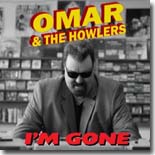 Omar Kent Dykes calls Omar & The Howlers’
latest CD his “Americana" CD. From rockabilly to a
ballad, and from country to blues, it’s all over the
place.” Maybe we could stop the review right there,
because that’s as good a capsule summary as you can
get, but it’s also worth mentioning that I’m Gone
(Big Guitar Music) also marks the 50th anniversary
of playing music for Dykes. What better way to honor
that landmark date than by releasing a collection of
the styles of music that inspired him to start down
his chosen path?
Omar Kent Dykes calls Omar & The Howlers’
latest CD his “Americana" CD. From rockabilly to a
ballad, and from country to blues, it’s all over the
place.” Maybe we could stop the review right there,
because that’s as good a capsule summary as you can
get, but it’s also worth mentioning that I’m Gone
(Big Guitar Music) also marks the 50th anniversary
of playing music for Dykes. What better way to honor
that landmark date than by releasing a collection of
the styles of music that inspired him to start down
his chosen path?
Growing up in McComb, Mississippi, Dykes was exposed
to all of these different types of music, and they
have all figured into his playing ever since he
started playing, or at least as far back as I
remember in the early ’80s, when he used to make
regular visits to clubs and festivals in
Mississippi. Rockabilly gets a bit of a revival (why
did it ever fade from the scene?) on the title cut
that opens the disc, the enjoyable instrumental,
“Omar’s Boogie,” “Move Up To Memphis,” and the
wistful autobiographical closer, “Take Me Back.”
“Drunkard’s Paradise” is a mournful country tune,
“Let Me Hold You” is a old school soul ballad, and
the restless rhythms of “Wild and Free” pay tribute
to Bo Diddley. The primary focus is on the blues, as
may be expected on an Omar & The Howlers’ disc. “All
About the Money” would have been a good fit on
Omar’s last two collaborations with Jimmie Vaughan,
and “Down to the Station” is a nice touch of Chicago
blues. The Texas-styled instrumental, “Lone Star
Blues,” is a show-stopper, and “Goin’ Back to Texas”
is a fine slow burner.
The disc’s lone cover is John Lee Hooker’s “I’m Mad
Again.” If it’s possible to take a song from Hooker
and make it your own, then Omar probably does that
here. His feral growl is at maximum power on this
angry track.
Dykes gets outstanding support from some of Austin’s
finest musicians. Casper Rawls plays acoustic and
electric guitars on several tracks, while Derek
O’Brien adds electric guitar on four tunes. Ronnie
James and Bruce Jones alternate tracks on bass, as
do Wes Starr and Mike Buck on drums.
Like any Omar & The Howlers release, I’m Gone
is a lot of fun to listen to over and over again.
There’s always plenty of good blues and you always
count on Omar to give 110% whenever he plays. I’m
looking forward to his next 50 years of making
music.
--- Graham Clarke
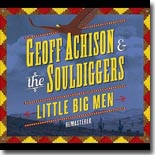 Australian Geoff Achison has been described
by Jefferson Airplane/Hot Tuna great Jorma Kaukonen
as having “a completely individual style.” Part of
that was derived from Achison’s early days as a
guitarist in rural Australia, where he was able to
learn to coax and recreate sounds and effects from
his guitars usually done by pedals or gadgets that
he didn’t have. His guitar work incorporates
elements of blues, jazz, and funk and he has a
soulfully gritty voice.
Australian Geoff Achison has been described
by Jefferson Airplane/Hot Tuna great Jorma Kaukonen
as having “a completely individual style.” Part of
that was derived from Achison’s early days as a
guitarist in rural Australia, where he was able to
learn to coax and recreate sounds and effects from
his guitars usually done by pedals or gadgets that
he didn’t have. His guitar work incorporates
elements of blues, jazz, and funk and he has a
soulfully gritty voice.
Achison won the Albert King Award for his guitar
work at the 1995 IBC in Memphis, and has released
several well-received albums over the past few
years. Little Big Men was actually released
in Australia in 2005, but is seeing wide
distribution in the U.S. for the first time on
Jupiter 2 Records, with a few added tracks from
Achison’s 2002 release, Chasing My Tail.
Little Big Men has a smooth, mellow, jazzy
feel and it’s easy to get lost in the music and miss
out on Achison’s songwriting. Highlights include the
opening cut, “Crazy Horse,” with a Santana-like
riff, “News,” which has a ’70s Steely Dan feel, the
funky “Happening” and “Rule The World,” and the
rocker, “Feel Like A King.”
All of the songs groove effortlessly, driven by the
stellar rhythm section of Roger McLachlan (bass),
Gerry Pantazis (drums), James Mack (percussion), and
Mal Logan (keyboards). Achison’s fretwork is
diverse….he has an almost liquid tone on some
tracks, but can get down and dirty when he needs to,
and also has a melodic quality that sounds a lot
like Larry Carlton’s ’70s work.
Little Big Men is a solid disc of smooth and
jazzy blues that you will find yourself returning to
regularly. Hopefully, it will help Geoff Achison in
finding a wider audience to experience his
impressive talent.
--- Bill Mitchell
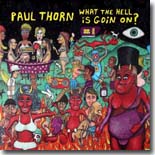 So why is Paul Thorn, regarded as a
songwriter without peer, releasing an album of songs
written by other composers? In the case of What
the Hell is Goin On? (Perpetual Obscurity
Records), Thorn has decided to take a break from his
own songs, just do something different, and have a
little fun.
So why is Paul Thorn, regarded as a
songwriter without peer, releasing an album of songs
written by other composers? In the case of What
the Hell is Goin On? (Perpetual Obscurity
Records), Thorn has decided to take a break from his
own songs, just do something different, and have a
little fun.
All 12 of the songs on this new disc are Thorn
favorites and he puts his own personal spin on each
of them. The songs cover the gamut from classic
blues, roots rock, country, gospel, and soul, but
they all end up sounding like Paul Thorn originals
by the time he gets finished with them……key examples
include the Lindsey Buckingham-penned opener, “Don’t
Let Me Down Again” (from the Buckingham/Nicks era),
Free’s “Walk In My Shadow,” and Allen Toussaint’s
“Wrong Number,” which, lyrically, could easily pass
for a Paul Thorn tune.
“Shelter Me Lord,” the Buddy & Julie Miller gospel
tune, is another fine example, with Thorn’s growling
vocal giving the song a whole new angle of
desperation (great backing vocals here by the
McCrary sisters, by the way, as on several other
tracks). Gospel was a huge part of Thorn’s
upbringing (his father was a preacher), and it shows
on a couple of other tracks as well….Foy Vance’s
“Shed a Little Light” and even soul/bluesman Eli
“Paperboy” Reed’s “Take My Love With You.”
Other standouts include a sweet reading of Donnie
Fritts and Billy Lawson’s “She’s Got a Crush on Me,”
a soulful reading of The Band’s “Small Town Talk,”
Elvin Bishop’s scorching blues title track (with the
man himself manning the six-string), and a stellar
reading of Wild Bill Emerson’s “Bull Mountain
Bridge,” featuring vocals from Delbert McClinton.
Football coach Bum Phillips once said of legendary
coach Paul “Bear” Bryant, “He can take your’n and
beat his’n, or he can take his’n and beat your’n.”
You might say the same of Paul Thorn. Not only is he
a songwriter of the highest quality, but with this
new disc, he shows himself to be a master
interpreter, too. If you didn’t know better, you’d
swear these were Paul Thorn originals. As it is,
What the Hell is Goin’ On? should keep you
occupied until the next set of Paul Thorn originals
surface.
--- Graham Clarke
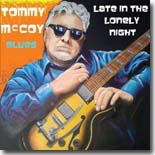 Guitarist Tommy McCoy has been playing the
blues since the early ’60s, and has been a member of
the Florida blues scene for over four decades as
part of local bands like the Backdoor Blues Band,
the Screamin’ Bluejays, and the Telephone Kings. He
also served as band leader for soul singer Johnny
Thunder, and has played on recordings with Levon
Helm, Commander Cody, Garth Hudson, Lucky Peterson,
and Double Trouble’s rhythm section.
Guitarist Tommy McCoy has been playing the
blues since the early ’60s, and has been a member of
the Florida blues scene for over four decades as
part of local bands like the Backdoor Blues Band,
the Screamin’ Bluejays, and the Telephone Kings. He
also served as band leader for soul singer Johnny
Thunder, and has played on recordings with Levon
Helm, Commander Cody, Garth Hudson, Lucky Peterson,
and Double Trouble’s rhythm section.
McCoy’s 7th CD, Late in the Lonely Night
(Earwig Records), features a dozen tracks of diverse
contemporary blues. He wrote or co-wrote ten of the
tracks and the two covers interestingly are sturdy
remakes of a pair of ’70s R&B hits from fellow
Floridians, the Cornelius Brothers & Sister Rose
(“Too Late To Turn Back Now” and “Treat Her Like A
Lady”).
The originals are uniformly excellent, including the
minor key title track that opens the disc, a song
puzzling over a love gone wrong. “Angel on my
Shoulder, Devil on my Back” tells of a battle
between good and bad and features some sizzling
slide from Joel Tatangelo. “Never Should Have
Listened” is a clever vocal duet between McCoy and
Karyn Denham, and “Spacemaster” is sizzling
blues/rock.
Other highlights include “Cars, Bars, and Guitars,”
the answer to the question, ”where did all my money
go?”, the introspective “Life’s Tides,” and the
appropriately titled “Dance Your Pants Off.” The
disc closer is “My Guitar Won’t Play Nothin’ But The
Blues,” and gives McCoy an opportunity to display
his fretwork.
Late in the Lonely Night is a first-rate set
of modern blues that features some strong
songwriting, seasoned vocals, and amazing guitar
work from Tommy McCoy. Though his last couple of
efforts have focused more on Americana, this set
shows that his roots are firmly in the fertile soil
of the blues.
--- Bill Mitchell
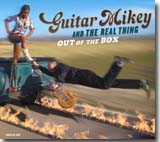 Guitar Mikey, aka Mike McMillan, started
playing the blues as a youngster in Canada. Over the
years, since the early ’80s, he has taken a long,
winding journey from Canada to Clarksdale,
Mississippi, with extended stops in Boston and
Chicago in between, working and honing his craft
with his band, The Real Thing. Since 2006, Guitar
Mikey has been a resident of Clarksdale, making
quite a reputation from himself with his fiery
guitar work (acoustic and electric) and impassioned
vocals.
Guitar Mikey, aka Mike McMillan, started
playing the blues as a youngster in Canada. Over the
years, since the early ’80s, he has taken a long,
winding journey from Canada to Clarksdale,
Mississippi, with extended stops in Boston and
Chicago in between, working and honing his craft
with his band, The Real Thing. Since 2006, Guitar
Mikey has been a resident of Clarksdale, making
quite a reputation from himself with his fiery
guitar work (acoustic and electric) and impassioned
vocals.
His fourth and newest release, Out of the Box,
is his first for Earwig Records, and features an
all-star roster of musicians in support, including
harmonica wizard Billy Gibson, singer Nellie “Tiger”
Travis, guitarist Bob Margolin, and keyboardists
David Maxwell, keyboardist Mark Yacovone, Terry “Big
T” Williams, and three, yes three, different rhythm
sections.
McMillan wrote or co-wrote all 15 of the tracks, and
they run the gamut from crunching blues/rock numbers
to straight roadhouse blues to smooth R&B.
Highlights include the rousing “Back To You,” which
kicks off the disc with a mandolin/banjo intro, but
kicks into high gear pretty quickly, “Blues Attack,”
which features his impressive slide guitar with
Travis’ vocals and Gibson’s roaring harmonica, the
manic “It’s A Sin,” and “Blues Head,” a fun track
that teams Mikey with Travis again, along with Super
Chikan, who plays guitar and offers moral support as
the track closes.
“The Bigger Fool,” has a definite Chicago feel to
it, with Gibson, Margolin, Maxwell, and young Delta
drummer Lee Williams doing a fine job. “Need $100”
is a funky little number that showcases Yacovone,
and the rocker “Who Is She” is another. “She Needs
Time” is a country blues cooker with Travis on
backing vocals, and “When Leo Starts To Growlin’” is
a deep soul number, one of several that feature
Alphonso Sanders on sax and the Hammerhead Horns.
Out of the Box is an enthusiastic, ambitious
set. There’s plenty of great music here for
everybody to enjoy, whether your tastes run more
toward traditional blues, blues/rock, R&B. Guitar
Mikey is well-versed in all of these genres and
you’ll be hearing more from him.
--- Graham Clarke
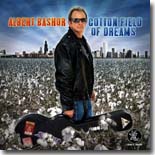 Albert Bashor is a Florida-based bluesman who
has paid his dues over the years playing with Bo
Diddley, James Peterson, Alex Taylor (brother of
James), Dr. Hector and the Groove Injectors, and the
immortal Root Boy Slim and the Sex Change Band. Over
the years, Bashor has developed as a songwriter and
singer, and he caught Earwig Records head Michael
Frank one night as half of an acoustic duo called
32-20 who was opening for Honeyboy Edwards in
Chattanooga one night. Frank, who accompanied
Edwards on harmonica, was impressed by Bashor’s
songs. The duo broke up, but Bashor and Frank soon
crossed paths again in Clarksdale, MS and Frank’s
interest was rekindled in recording Bashor.
Albert Bashor is a Florida-based bluesman who
has paid his dues over the years playing with Bo
Diddley, James Peterson, Alex Taylor (brother of
James), Dr. Hector and the Groove Injectors, and the
immortal Root Boy Slim and the Sex Change Band. Over
the years, Bashor has developed as a songwriter and
singer, and he caught Earwig Records head Michael
Frank one night as half of an acoustic duo called
32-20 who was opening for Honeyboy Edwards in
Chattanooga one night. Frank, who accompanied
Edwards on harmonica, was impressed by Bashor’s
songs. The duo broke up, but Bashor and Frank soon
crossed paths again in Clarksdale, MS and Frank’s
interest was rekindled in recording Bashor.
The results can now be heard on Bashor’s debut
Earwig release, Cotton Field of Dreams, where
Bashor gives us a taste of what impressed Frank, 14
highly original songs with a unique perspective of
the blues. Bashor’s vision of the blues takes in
elements of soul, pop, rock and even folk, and he
has a warm, inviting voice that engages the listener
immediately. He has great support from a fine cast
of musicians including Frank (who plays harmonica on
a couple of tracks), Little Feat keyboardist Bill
Payne, and guitarist Pat Travers.
Highlights include the funky opener, “Jukin’ Down on
Johnson Street,” the rollicking “Rockin’ Red
Rooster” (originally covered by Lonnie Brooks…this
version features Payne’s rowdy barrelhouse piano),
“So Blue,” with Mike McConnell playing some tasty
acoustic guitar and Shay Jones’ contributing vocals,
and the atmospheric title track. The humorous
“Seeing Eye Dog Blues” and “Tater Digging Woman” are
also standouts, and Travers’ six-stringed
contributions to “Fetch Me,” make a good tune even
better.
We can’t close this review without mentioning the
“Poodle Ribs.” Bashor introduces the song with the
story-behind-the-song, which is pretty funny in
itself. The song is also entertaining as well, and
serves as good advertising for one of Bashor’s
favorite Florida eating establishments.
Cotton Field of Dreams is not your
run-of-the-mill blues album, and it’s certainly
different from the usual Earwig fare. However,
Bashor is a talented songwriter who mixes personal
perspective into his songs, a gifted performer, and
his love for the blues comes through on every note.
Hopefully, he has more to say and gets the
opportunity to do so.
--- Graham Clarke
 Back Number (Ruf Records) is the latest release by
The Jimmy Bowskill Band. Amazingly, it’s the
fifth release from the 21-year-old Canadian, who’s
mastered that ’70s southern blues/rock sound in the
tradition of groups like Grand Funk Railroad, Humble
Pie, or even more modern-day artists like the Black
Crowes. Bowskill is an exceptional guitarist, but
also has an incredibly expressive vocal style as
well. He’s backed by the powerhouse duo of Ian
McKeown (bass) and Dan Reiff (drums), along with
Aaron Hoffman on keyboards.
Back Number (Ruf Records) is the latest release by
The Jimmy Bowskill Band. Amazingly, it’s the
fifth release from the 21-year-old Canadian, who’s
mastered that ’70s southern blues/rock sound in the
tradition of groups like Grand Funk Railroad, Humble
Pie, or even more modern-day artists like the Black
Crowes. Bowskill is an exceptional guitarist, but
also has an incredibly expressive vocal style as
well. He’s backed by the powerhouse duo of Ian
McKeown (bass) and Dan Reiff (drums), along with
Aaron Hoffman on keyboards.
Back Number has 11 tracks, with Bowskill
writing or co-writing (with the band or with
songwriter Ron Sexsmith) nine of them. “Take a Ride”
is the opener, a slow rocker. “Linger on the Sweet
Side” picks up the pace a bit and is a highlight.
The Sexsmith/Bowskill collaboration, “Little Bird,”
is another standout, and the ballad, “Spirit of the
Town,” a ballad with Bowskill manning the trumpet
and McKeown the trombone, is an interesting change
of pace.
The band also covers Mark Farner’s (of Grand Funk
Railroad) “Sin’s a Good Man s Brother,” retaining
the original’s down and dirty vibe, and “Sinking
Down” also is in that vein as well. “Down the Road”
is a churning rocker that features some of
Bowskill’s most impressive fretwork. “Seasons
Change” slows things down before the final two
tracks, a basically bluesy “Broke Down Engine,” and
the Sexsmith composition, “Least of My Worries,” a
breezy jazz nugget that showcases Bowskill playing
some rousing piano.
It’s hard to believe that Jimmy Bowskill’s only 21
years old. Back Number is a diverse, but
fully developed set of blues/rock that shows him to
have a bright future in the genre, if there’s any
justice in the world at all.
--- Graham Clarke
 Ho hum…..another day, another great guitarist from
Texas. This time around, it’s Chris Watson, from
Denton, Texas. He’s all of 20 years old and has been
playing since he was 13, joining his father’s blues
band as lead guitarist in 2005. He’s been the leader
of his own band, the Chris Watson Band, since
2006 and has made quite a mark in the D/FW area
clubs and with his debut release in 2010, Just
for Show. Oh yeah….this guy is the real deal.
His sophomore release, Pleasure & Pain (Gator
Groove Records), is all the proof you need.
Ho hum…..another day, another great guitarist from
Texas. This time around, it’s Chris Watson, from
Denton, Texas. He’s all of 20 years old and has been
playing since he was 13, joining his father’s blues
band as lead guitarist in 2005. He’s been the leader
of his own band, the Chris Watson Band, since
2006 and has made quite a mark in the D/FW area
clubs and with his debut release in 2010, Just
for Show. Oh yeah….this guy is the real deal.
His sophomore release, Pleasure & Pain (Gator
Groove Records), is all the proof you need.
Watson wrote nine of the 12 tracks. They range from
the funky opener (“Heart on My Sleeve”), to the
blazing Texas shuffle, “Untrue,” to contemporary
blues (the title track and “She’s Wild”), to soulful
ballads (“Heartache”), to straight-ahead blues/rock
(“Mama Told Me”), to country-tinged blues (“Happiest
Day of My Life”) to swamp blues (“Wanted Man”). The
three cover tunes are also first-rate, the
traditional gospel tune, “Going Home,” a scrappy
cover of Sean Costello’s “Hard Luck Woman,” and
Bobby Womack’s ’70s soul classic, “Check It Out.”
Watson has a smooth soulful voice and his guitar
work is really impressive. He doesn’t overplay or
try to bombard you with walls of sound. His fretwork
is very tasteful, and he says what he needs to say
and lets the song do the rest, displaying a maturity
beyond his years. His band (Billy Acord and Chris
Gipson – bass, Jon Zoog and Jason Thomas – drums,
Scott Morris and Eric Scortia – keys, Justin Barbee
– trumpet, Jeff Dazey – sax, and Kristin Major –
backing vocals) provides excellent support.
Rest assured that Chris Watson is not just “another
great Texas guitarist.” Pleasure & Pain is a
marvelous, well-rounded set of blues, soul, and R&B,
from a young man who can play, sing, and write with
the best of them. We’ll be hearing a lot more from
him in the coming years.
--- Graham Clarke
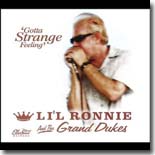 Li’l Ronnie & the Grand Dukes have been
singing and playing the blues for over a quarter
century. Ronnie Owens got his start playing drums at
the age of 8, playing gigs at 13, and playing swing,
jazz, rock & roll, and R&B, but fell under the sway
of the post-war Chess-era urban blues. He switched
from drums to harmonica and has never looked back.
Li’l Ronnie & the Grand Dukes have been
singing and playing the blues for over a quarter
century. Ronnie Owens got his start playing drums at
the age of 8, playing gigs at 13, and playing swing,
jazz, rock & roll, and R&B, but fell under the sway
of the post-war Chess-era urban blues. He switched
from drums to harmonica and has never looked back.
Gotta Strange Feeling (EllerSoul Records) is
the band’s fourth CD and like their previous output,
the focus is on American roots music blending blues,
swing, and rock & roll. Most of the songs were
writing by L’il Ronnie and guitarist Ivan Appelrouth,
and they focus several blues styles, including the
Chicago blues sound of the ’50s, with songs like
“Can’t Buy My Love,” “She’s Bad Bad News,” and “Fat
City,” but there’s also a healthy dose of swinging
blues with songs like the title track, “Sweet Sue,”
and “Bring Your Love Home.”
Other selections, like “I Won’t Take It Anymore,”
“Cold Hard Cash” and “Love Never Dies,” have a
strong Gulf Coast flavor. The band also offers a
swinging cover of Louis Jordan’s “Buzz Me” and a
pretty straightforward rocking version of Chuck
Berry’s “C’est La Vie.”
L’il Ronnie does a splendid job on vocals and
harmonica. The rest of the Grand Dukes (Ivan
Appelrouth – guitar, John Sheppard – bass, Mark
Young – drums, John Fralin – piano, and guest North
Side Slim on percussion for one track) handle the
blues, rock & roll, and swing with ease. If you like
your blues and rock & roll in the old school style,
then you need to pick up Gotta Strange Feeling.
--- Graham Clarke
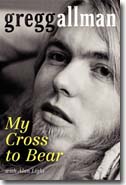 Gregg Allman has long been regarded as one of
the finest rock singers ever, and he also ranks
pretty high as a blues singer as well. In the late
’60s, The Allman Brothers Band provided the
blueprint for both blues/rock and Southern rock with
their intriguing mixture of rock and roll, soul,
blues, and jazz, also setting the stage in the
process with their lengthy jam sessions for the jam
bands of today.
Gregg Allman has long been regarded as one of
the finest rock singers ever, and he also ranks
pretty high as a blues singer as well. In the late
’60s, The Allman Brothers Band provided the
blueprint for both blues/rock and Southern rock with
their intriguing mixture of rock and roll, soul,
blues, and jazz, also setting the stage in the
process with their lengthy jam sessions for the jam
bands of today.
Gregg Allman provided the voice of the band, while
his brother Duane provided the musical vision of the
band, and for a brief amount of time, until Duane’s
untimely death in 1971, no one could touch The
Allman Brothers for sheer musical originality,
talent, and virtuosity.
After 1971, the band pushed on, coping with the 1972
death of bass player Berry Oakley, power struggles
within the band, excessive drug and alcohol use, and
clashes about musical direction. Gregg Allman was at
the center of much of this, juggling drugs, a solo
career, multiple marriages (notably to Cher), and
difficulties with management as well as fellow band
members. While most of his problems came and went,
the drugs and alcohol persisted until the mid 2000s,
when he finally cleaned up for good.
Allman recounts these star-crossed day with his new
autobiography, "My Cross To Bear" (William Morrow)
with help from frequent Rolling Stone contributor
Alan Light. In fact, Light does a wonderful job
allowing Allman to tell his story, which begins at
the beginning, of course, where the brothers grew up
without a dad, who was ruthlessly murdered when
Gregg was two, by a hitchhiker he had picked up.
They also spent time in a military school, while
their mother went to college.
Allman was a shy child and teenager, who was drawn
out of his shell by the allure of music. It was he
who first learned the guitar, not Duane, while the
two were teenagers in Daytona, Florida. The older
brother soon caught up with and surpassed the
younger, but in the process, Gregg Allman developed
into an amazing singer, courtesy of support and
coaching from local musicians like Floyd Miles.
The brothers bounced around with several groups,
recording as the group Hour Glass, before The Allman
Brothers came together. Allman candidly discusses
the friendly rivalry and fierce love and loyalty
between the two brothers and the rest of the band.
By this time, the drug use had emerged and was
beginning to affect the band. One of the most
heartbreaking and haunting sequences in the book is
Gregg and Duane’s last conversation prior to Duane’s
tragic death, a drug-fueled argument that still eats
at Gregg Allman today.
He also takes the reader through the band’s
inevitable decline that paralleled the ’70s, his
ongoing battles with bandmate Dickey Betts, the
band’s break-ups and reunions through the late ’70s,
the ill-fated relationship and marriage to Cher
(with some scathing commentary on her singing
abilities), and his own solo career that reignited
in the late ’80s, prior to the Allman’s last reunion
that was triggered in part by the release of the
retrospective box set, Dreams. Since the
early ’90s, the Allmans have enjoyed great success,
and their current line-up is probably as potent as
the original with a sober Gregg Allman and
guitarists Warren Haynes and Derek Trucks.
The final quarter of the book is devoted in large
part to Allman’s attempts to clean up once and for
all, and his subsequent recovery, followed by his
greatest challenge, hepatitis C and a liver
transplant. He also talks about his attempts to
reconcile with his children, most of whom he had
little contact with until recent years, and his
emerging spirituality and relationship with God.
As mentioned, Light basically lets Allman narrate
the story in his own voice, which was the right
move. It feels almost like he’s talking directly to
you, telling you stories about wild nights on the
road with drugs, drink, and women. Some of the
anecdotes are downright hilarious and some are
poignant and even tragic. Best of all, though Allman
is often critical about the supporting characters in
his life (notably Betts and Capricorn Records head
Phil Walden), he is equally critical of his own
behavior and conduct, taking responsibility where
it’s due and setting the record straight where
needed as well.
All in all, if you’re a blues/rock fan, this book is
an essential read….an eyewitness account of the
development, success, failure, death, and rebirth of
arguably the greatest blues/rock band ever, plus a
rare intimate look at one of the most enigmatic
performers of our time.
--- Graham Clarke
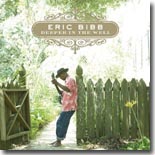 It's been a good year already for acoustic guitarist
Eric Bibb, who was recently named Acoustic
Artist of the Year by the Blues Foundation in
Memphis. Not one to rest on his laurels, Bibb is
already making a case for next year's award with his
new album, Deeper In The Well (Stony Plain
Records). For this one, the New York native went
about as far south as he could get, recording the CD
at Dirk Powell's studio in Pont Breaux, Louisiana.
In addition to the versatile instrumentalist Powell,
participating in the session were a host of other
local musicians, including fiddle player Cedric
Watson, harmonica player Grant Demody and drummer
Danny DeVillier. Christine Balfa adds Cajun
triangle.
It's been a good year already for acoustic guitarist
Eric Bibb, who was recently named Acoustic
Artist of the Year by the Blues Foundation in
Memphis. Not one to rest on his laurels, Bibb is
already making a case for next year's award with his
new album, Deeper In The Well (Stony Plain
Records). For this one, the New York native went
about as far south as he could get, recording the CD
at Dirk Powell's studio in Pont Breaux, Louisiana.
In addition to the versatile instrumentalist Powell,
participating in the session were a host of other
local musicians, including fiddle player Cedric
Watson, harmonica player Grant Demody and drummer
Danny DeVillier. Christine Balfa adds Cajun
triangle.
The result is an excellent addition to Bibb's rich
discography. If you're already a fan, then you'll
want to hear what the man can do when he goes all
Louisiana on us.
The title cut is the highlight, a version of the
classic song of encouragement done over the years by
a host of bluegrass and country artists. Bibb's
version was most influenced by Doc & Merle Watson's
rendition, but this one really carries a feel of the
Louisiana bayou.
There's even more a Cajun influence to "Money In
Your Pocket," with Cedric Watson's fiddle playing
and Powell's accordion work. The opening cut, "Bayou
Belle," has a real swampy, haunting feel to it that
takes the listener deep into the bayou country late
at night.
Perhaps Bibb is anticipating that a portion of his
fan base will not accept this album, since it's much
more diverse than his previous recordings. He
answers those critics musically with the up tempo
"Music," stating, " ... music is more than rules
rules or tradition, I'll play what I want, don't
need no permission, If I feel it - that's good
enough for me ..." Even more descriptive is the
verse, " ... music is more than the words used to
pitch it, I don't see the point wastin' time trying'
to niche it ..." Great!
Bibb gets political on "Movin' Up," encouraging his
listeners to keep on trying and help your fellow
man. I especially like the topical verse, "....We
got some billionaires out there, But the poor stay
poor, Spendin' too much money on weapons an' war,
Can't keep hidin' our heads in the sand, Time to see
what's goin' on an' take a stand ..."
The Taj Mahal cover, "Every Wind In the River,"
features nice vocals from Bibb on a number with a
real spiritual feeling. Michael Jerome Browne
accompanies on banjo and mandolin.
Deeper In The Well finishes with one of the
more interesting numbers, a cover of Bob Dylan's
"The Times They Are A Changin'," with Powell's banjo
work providing tasteful accompaniment to Bibb's
provocative vocals.
Bibb is an artist who's operated somewhat out of the
blues mainstream over the years with more of an
audience on the folk circuit. With a Blues
Foundation award in his pocket and this fine CD to
promote, here's hoping that Bibb's popularity is
about to get a big boost.
--- Bill Mitchell